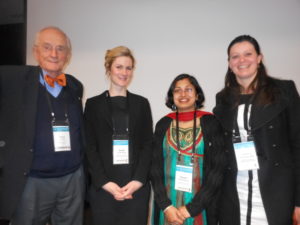
2014 Young Scholar: Temma Carruthers-Taylor

Temma Carruthers-Taylor
Australian National University
Sponsored by the ACT Committee
After completing school in Canberra, Temma worked as a jillaroo in remote Wester Australia (Pilbara). It was during this time she gained a deep appreciation for the age and beauty of our earth. She pursued this interest through a degree in geology and soil science at the Australian National University, and by undertaking rice paddy soil research in Vietnam. During the research, she gained experience conducting research in a developing country and learned about more South East Asian culture, people and science. At the conference, Temma seeks to expand her knowledge of the practical side of agriculture and food efficiency challenges, as well as the ethical concerns in achieving a well-rounded understanding of agricultural systems.
Conference report
Gaining a wider understanding of food issues was is exactly what I wanted to get out of attending the conference, and I now can develop this knowledge in my personal and professional life.”
Coming from a science background, I came to the Feeding 9 Billion, Well conference in search of information and knowledge on food production to consumer issues. Before the conference I had a broad but shallow understanding of the issues to be discussed, but I lacked an understanding of the practical aspects. Feeding 9 Billion, Well allowed me to get an understanding of the decisions and challenges we face as a first world nation and globally. I attained well-rounded awareness of the ethical, economic and food security issues that are prevalent and possible solutions to the food crisis.
I achieved a wider understanding of the importance of nutrition, changing food demands and cultural emphasis on particular foods. Dr. Shenggen Fan demonstrated that not only is there a need for more food, but the type of food and a balanced diet is equally important. An increased demand for meat and dairy products will soon become a major problem to both food production and distribution. The increased demands on meat will also have a flow-on impact by increasing demands on cereal crops and water supplies and will also intensification demands on refrigeration and transportation and increase demand on energy. Cultural attitudes towards food, as demonstrated predominantly by Dr. Norah Omot, can be an important consideration. As an example, people in PNG avoid potatoes because they are considered as village people foods and are therefore not favourable to those that consider themselves higher in status. Although I understood the impact of cultural attitudes and traditions to some extent, it was only during this conference I realised that full extent of the possible impact of these attitudes.
The solutions included emphasising the importance of women in agriculture, where education (at least primary school) can help reduce population growth, illustrated by Dr. Laurent Zessler. Catherine Bertini discussed that increasing women’s rights, and most particularly in the agricultural sector in second and third world countries, will also help to increase food security. Luke Chandler also discussed that Australia also has a role to play within the solution, by ensuring supply chain quality of meat and grain products and growing wheat and beef because we have the space. Waste is a major problem and Dr. Helen Szoke indicated that reducing, or at least reusing, waste could be a key to a successful feed population. Most of all agricultural technologies and research will play a pivotal role in feeding 9 billion, well, to increase food security, efficiency and help manage dietary nutrition.
The highlights of the conference for me was the Young Agriculture Scientists Forum and gaining a wider understanding of the issues to do with food production, transport, nutrition, security and ethics. The forum was a great way to meet people who are both starting out and those that have extensive experience and can pass on helpful knowledge. Gaining a wider understanding of food issues was is exactly what I wanted to get out of attending the conference, and I now can develop this knowledge in my personal and professional life.
